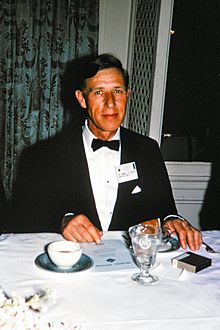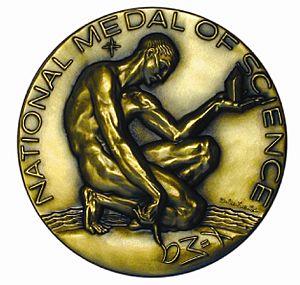Konrad Emil Bloch facts for kids
Quick facts for kids
Konrad Emil Bloch
|
|
|---|---|

Bloch in 1965
|
|
| Born | January 21, 1912 Neisse, Prussian Silesia, German Empire (today Poland)
|
| Died | October 15, 2000 (aged 88) |
| Nationality | German-American |
| Alma mater | Technische Universität München |
| Known for | Discoveries with the mechanism and regulation of the cholesterol and fatty acid metabolism |
Konrad Emil Bloch, ForMemRS (21 January 1912 – 15 October 2000) was a German American biochemist. Bloch received the Nobel Prize in Physiology or Medicine in 1964 (joint with Feodor Lynen) for discoveries concerning the mechanism and regulation of the cholesterol and fatty acid metabolism.
Life and career
Bloch was born in Neisse (Nysa), in the German Empire's Prussian Province of Silesia. From 1930 to 1934, he studied chemistry at the Technical University of Munich. In 1934, due to the Nazi persecutions of Jews, he fled to Davos, Switzerland, before moving to the United States in 1936. Later he was appointed to the department of biological chemistry at Yale Medical School.

In the United States, Bloch enrolled at Columbia University, and received a Ph.D in biochemistry in 1938. He taught at Columbia from 1939 to 1946. From there he went to the University of Chicago and then to Harvard University as Higgins Professor of Biochemistry in 1954, a post he held until 1982. After retirement at Harvard, he served as the Mack and Effie Campbell Tyner Eminent Scholar Chair in the College of Human Sciences at Florida State University.
In 1985, Bloch became a Fellow of the Royal Society. In 1988, he was awarded the National Medal of Science.
Bloch and his wife met in Munich. They married in the U.S. in 1941. They had two children and two grandchildren. He was fond of skiing, tennis, and music. Konrad died in Lexington, Massachusetts of congestive heart failure in 2000, aged 88.
Images for kids
See also
 In Spanish: Konrad Bloch para niños
In Spanish: Konrad Bloch para niños



